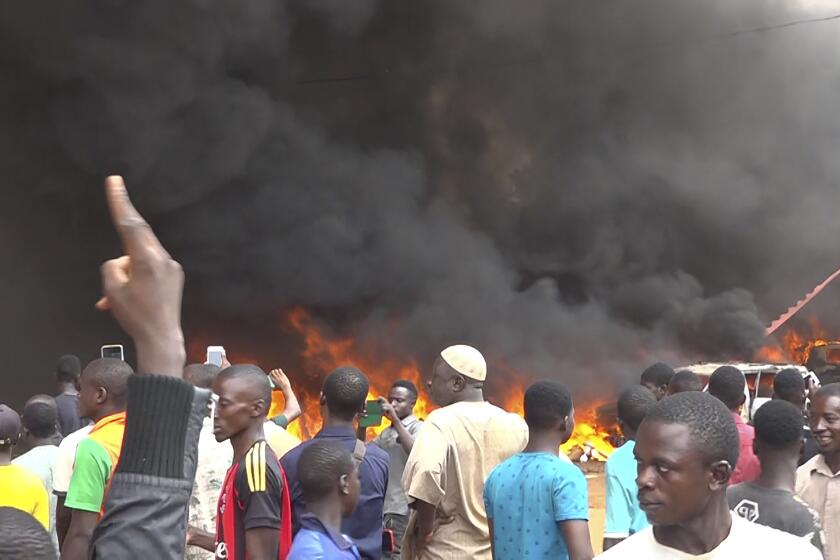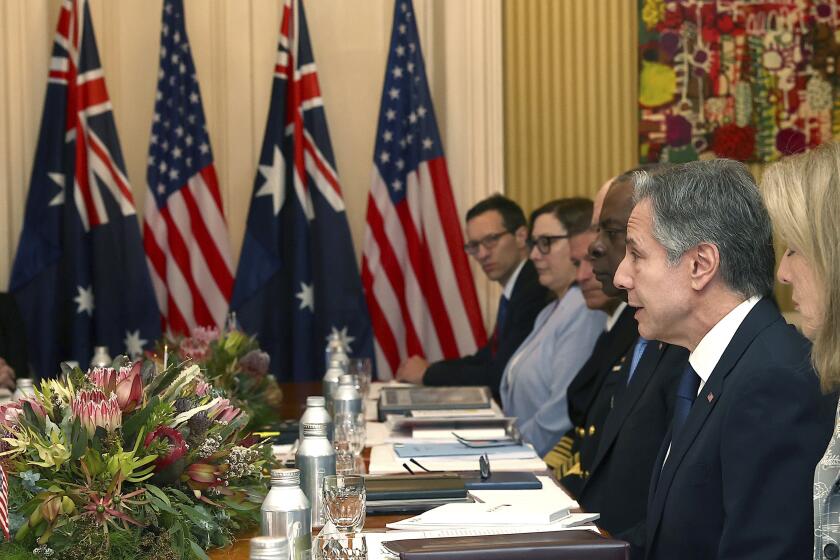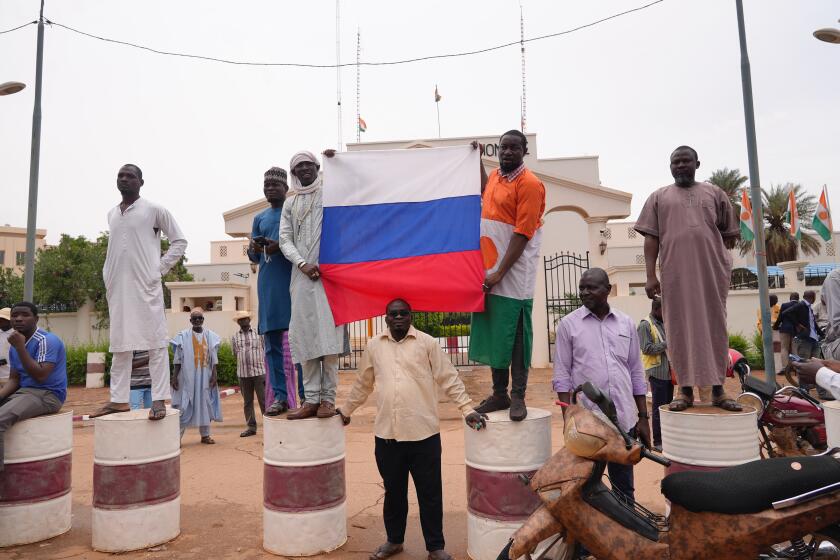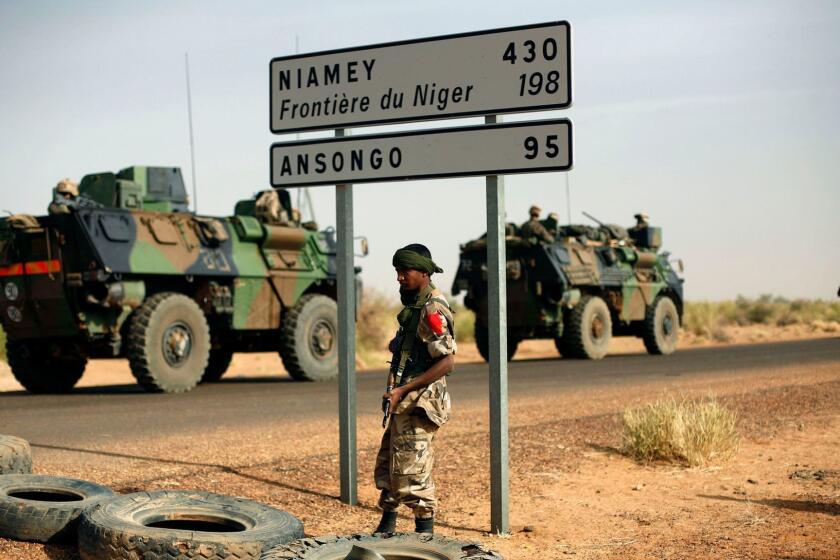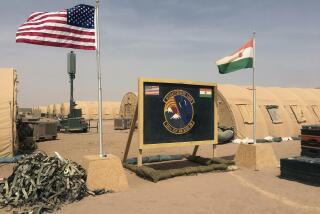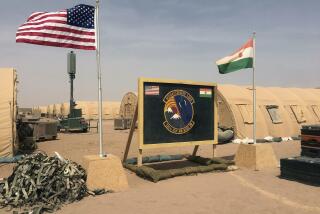Niger faces sanctions, adding to woes for more than 25 million people
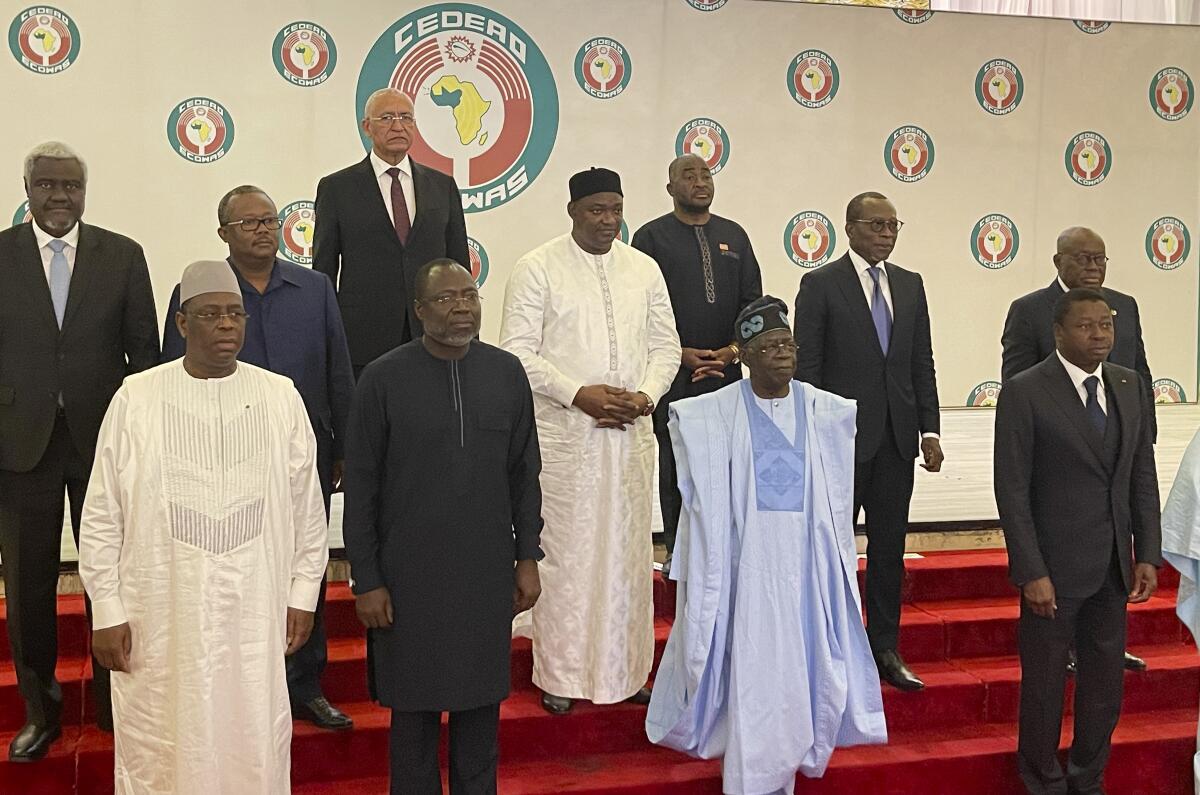
- Share via
NIAMEY, Niger — Economic sanctions could severely hurt one of the world’s poorest nations after a coup unseated one of the West’s last democratic partners against Islamic extremists in West Africa’s Sahel region.
Niger’s neighbors are also threatening armed intervention against the junta run by the head of the presidential guard, although analysts say there is only a slim chance of the regional body successfully sending troops.
Both the United States and France have sent forces and hundreds of millions of dollars in military and humanitarian aid in recent years to Niger, which was a French colony until 1960. The French and the U.S. train Nigerien forces, and the French military carries out joint operations in the north.
Since the coup that ousted President Mohamed Bazoum, people have been toting Russian flags and praising that country in pro-junta demonstrations.
U.S. Secretary of State Antony J. Blinken visited Niger in March to strengthen ties and announce $150 million in direct assistance, calling the country “a model of democracy.” France pulled out of Mali last year and has some 1,500 troops in Niger.
Niger is seen as the last reliable partner for the West to battle jihadists linked to Al Qaeda and Islamic State in Africa’s Sahel region. A coup endangers that.
The Economic Community of West African States announced travel and economic sanctions against Niger on Sunday over the coup and said the regional bloc, known as ECOWAS, would use force if the coup leaders don’t reinstate him within one week.
Since the 1990s, the 15-nation bloc has unsuccessfully tried to protect democracies against the the threat of coups, with mixed success.
Niger relies heavily on foreign aid and sanctions could further impoverish its more than 25 million people. ECOWAS suspended all commercial and financial transactions between its member states and Niger, as well as freezing Nigerien assets held in regional central banks.
The sanctions could be disastrous and Niger needs to find a solution to avoid them, Prime Minister Ouhoumoudou Mahamadou told French media outlet Radio France Internationale on Sunday.
“When people say there’s an embargo, land borders are closed, air borders are closed, it’s extremely difficult for people.... Niger is a country that relies heavily on the international community,” he said.
U.S. Secretary of State Antony Blinken says political instability in Niger resulting from a military takeover that deposed the country’s president this week threatens Washington’s economic support to the African nation.
Four nations are run by military governments in West and Central Africa, where there have been nine successful or attempted coups since 2020.
In the 1990s, ECOWAS intervened in Liberia during its civil war, one of the bloodiest conflicts in Africa and one that left many wary of intervening in internal conflicts. In 2017, ECOWAS intervened in the Gambia to prevent the new president’s predecessor, Yahya Jammeh, from disrupting the handover of power. Around 7,000 troops from Ghana, Nigeria and Senegal entered the country, according to the Global Observatory, which provides analysis on peace and security issues. The intervention was largely seen as accomplishing its mission.
If the regional bloc uses force, it could trigger violence not only between Niger and ECOWAS forces but also between civilians supporting the coup and those against it, Niger analysts say.
“While this remains to be a threat and unlikely action, the consequences on civilians of such an approach if putschists chose confrontation would be catastrophic,” said Rida Lyammouri, senior fellow at the Policy Center for the New South, a Morocco-based think tank.
Lyammouri also said he does not see a “military intervention happening because of the violence that could trigger.”
Niger’s president defiantly declared that democracy would prevail, a day after mutinous soldiers detained him.
Blinken on Sunday commended the resolve of the ECOWAS leadership to “defend constitutional order in Niger” after the sanctions announcement, and joined the bloc in calling for the immediate release of Bazoum and his family.
The military junta, which seized power Wednesday when members of the presidential guard surrounded Bazoum’s house and detained him, is already cracking down on the government and civil liberties.
On Sunday evening it arrested four government officials, including Mahamane Sani Mahamadou, the minister of petroleum and son of former President Mahamadou Issoufou; Kassoum Moctar, minister of education; Ousseini Hadizatou Yacouba, the minister of mines, and Foumakoye Gado, the president of the ruling party. That’s according to someone close to the president, who was not authorized to speak about the situation, and a Nigerien analyst who did not want to be named for fear of reprisal.
The same night, junta spokesman Col. Maj. Amadou Abdramane said on state television that all government cars must be returned by midday Monday and banned the use of social media to put out messages he described as harmful to state security. He also claimed that Bazoum’s government had authorized the French to carry out strikes to free Bazoum, allegations that were not confirmed.
As America increases its military footprint in some of Africa’s most dangerous trouble spots, confronting extremist affiliates of Al Qaeda and Islamic State, the risk of intelligence failures and more combat deaths is mounting.
Bazoum has yet to resign. He is still being detained and believed to be in his house in the capital, Niamey. The first photos of him since the coup appeared Sunday evening, sitting on a couch smiling beside Chad’s President Mahamat Deby, who had flown in to mediate between the government and the junta.
In anticipation of the ECOWAS decision Sunday, thousands of pro-junta supporters took to the streets in Niamey, denouncing France, waving Russian flags and telling the international community to stay away.
Demonstrators in Niger are openly resentful of France, and Russia is seen by some as a powerful alternative. The nature of Moscow’s involvement in the rallies, if any, isn’t clear, but some protesters have carried Russian flags, along with signs reading “Down with France” and supporting Russian President Vladimir Putin.
“The situation of this country is not good.... It’s time for change, and change has arrived,” said Moussa Seydou, a protester. “What we want from the putschists — all they have to do is improve social conditions so that Nigeriens can live better in this country and bring peace.”
More to Read
Sign up for Essential California
The most important California stories and recommendations in your inbox every morning.
You may occasionally receive promotional content from the Los Angeles Times.
